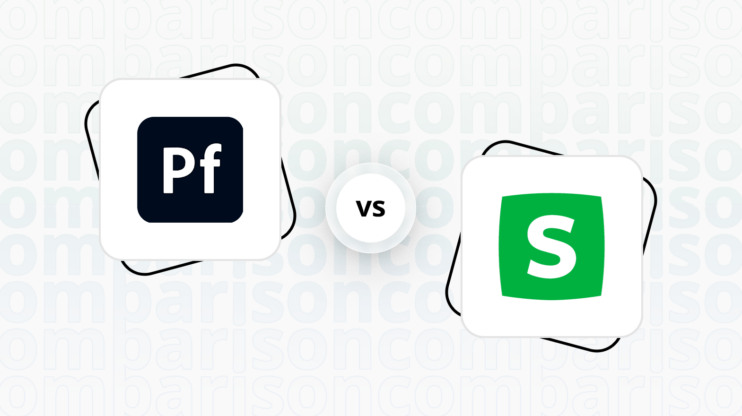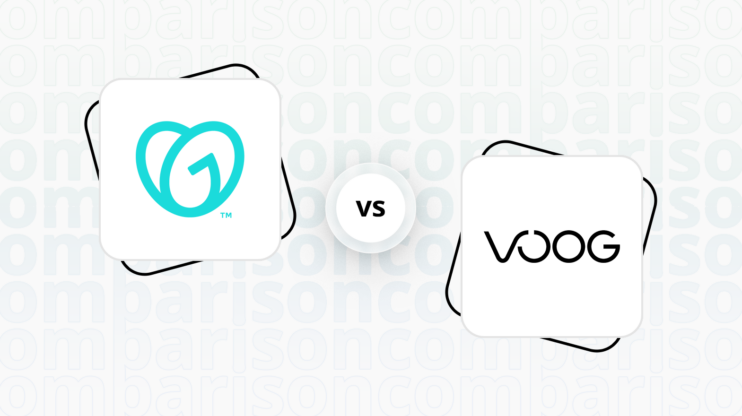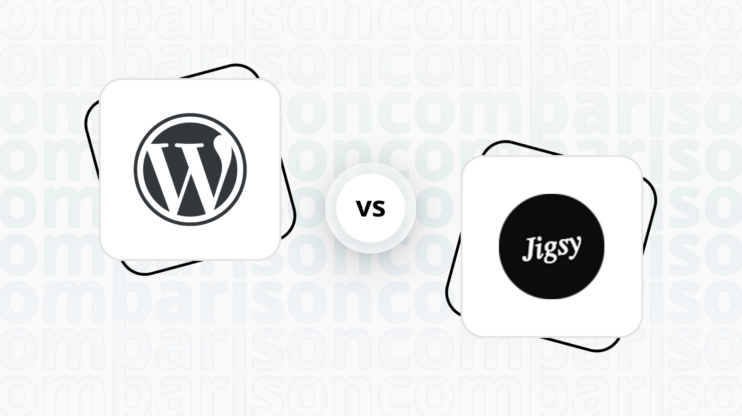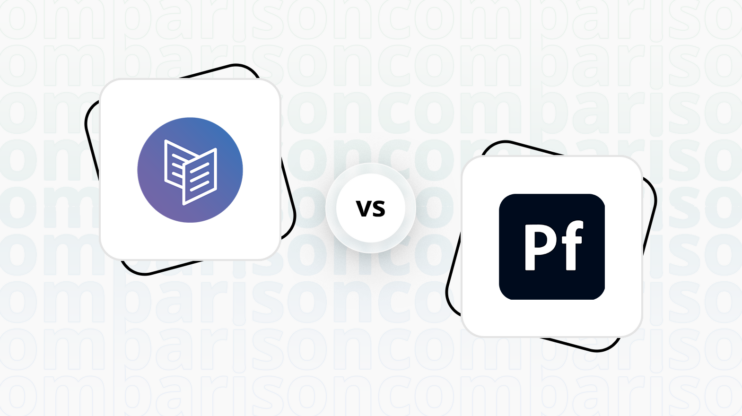Final verdict
Google Sites vs Dreamhost: Both platforms offer unique advantages, but they cater to different user needs.
-
Google Sites (Overall Grade: 5.6/10)
is ideal for users seeking a simple, collaborative website builder with seamless integration with Google services. It excels in ease of use and security, making it a great choice for team projects, personal portfolios, and small business websites. However, it lacks built-in ecommerce features and advanced customization options, which may limit its appeal for more complex website needs. -
Dreamhost (Overall Grade: 6.7/10)
offers a more robust solution with its comprehensive website builder and hosting platform. It provides extensive customization options, a wide range of themes, and strong ecommerce capabilities, making it suitable for both beginners and experienced users. Dreamhost also excels in hosting quality, plugins and integrations, and customer support, making it a reliable choice for users looking for a professional and scalable web hosting solution.

|

|
|
|---|---|---|
|
Design functionalities & templates |
4.9 |
7.6 |
|
Ease of use |
8.3 |
8.2 |
|
Ecommerce |
1.8 |
7.4 |
|
Website editors |
7.0 |
7.3 |
|
Product testing options |
6.9 |
2.7 |
|
Price |
8.1 |
7.8 |
|
Hosting quality |
8.2 |
7.2 |
|
Website speed optimization |
3.3 |
3.5 |
|
Plugins/extensions and integrations |
6.4 |
8.8 |
|
Marketing features |
2.6 |
8.0 |
|
Customer support |
7.2 |
7.5 |
|
Website security |
9.3 |
8.2 |
|
AI capabilities |
0 |
1.2 |
|
User management |
7.8 |
8.8 |
Best for ecommerce
 1.8
1.8
 7.4
7.4
Verdict
: Dreamhost is the clear winner for ecommerce, offering a robust set of features and integrations, while Google Sites falls short with its lack of built-in ecommerce capabilities.
-
Google Sites
: Google Sites is not designed for ecommerce. It lacks built-in ecommerce features and relies on third-party tools and widgets for any ecommerce functionality. This makes it a less viable option for businesses looking to sell products online. When comparing Google Sites vs Dreamhost, Google Sites is more suited for simple, informational websites rather than ecommerce. -
Dreamhost
: Dreamhost excels in the ecommerce space with its WooCommerce-ready themes, Magento and Shopify integrations, and support for various payment gateways. It provides a comprehensive solution for businesses looking to establish a strong online store. Dreamhost’s platform is designed to cater to both beginners and experienced users, making it a versatile choice for ecommerce.
Best for informational & business websites
 7.2
7.2
 7.5
7.5
Verdict
: Dreamhost slightly edges out Google Sites for informational and business websites due to its more comprehensive design functionalities and robust hosting solutions.
-
Google Sites
: Google Sites is a straightforward tool for creating basic websites, especially for users already integrated into the Google ecosystem. Its drag-and-drop interface and seamless integration with Google services make it ideal for team projects and small business websites. However, it offers limited design customization and template variety, which might not meet the needs of more complex business websites. Best for informational business websites score: 7.2. -
Dreamhost
: Dreamhost’s website builder, Remixer, provides a higher degree of customization flexibility and a wider range of themes and templates. It caters to both beginners and experienced users, offering a robust hosting solution with shared and cloud hosting options. Dreamhost’s integration with WordPress also allows for advanced features and easy migration. Best for informational business websites score: 7.5.
Detailed comparison
Design functionalities & templates
Design FunctionalitiesRepresents how well each platform allows for creative design and customization of websites.Score Components:
- Template Variety (30%): Range and quality of design templates.
- Customization (30%): Flexibility and options for design alterations.
- User Interface (20%): Ease and intuitiveness of the design process.
- Responsiveness (10%): Adaptability to different devices and screen sizes.
- Innovation (10%): Unique design features and tools.
 4.9
4.9
 7.6
7.6
🏆
Winner: Dreamhost.
Dreamhost offers a more comprehensive website builder with a higher degree of customization flexibility and a wider range of themes and templates compared to Google Sites.
Google Sites offers a limited number of templates suitable for various purposes, from personal blogs to business websites. These templates are designed for user engagement, simplicity, and functionality, allowing for customization to meet specific needs. However, compared to other website builders like 10Web or Squarespace, Google Sites might offer less variety in templates and design customization options.
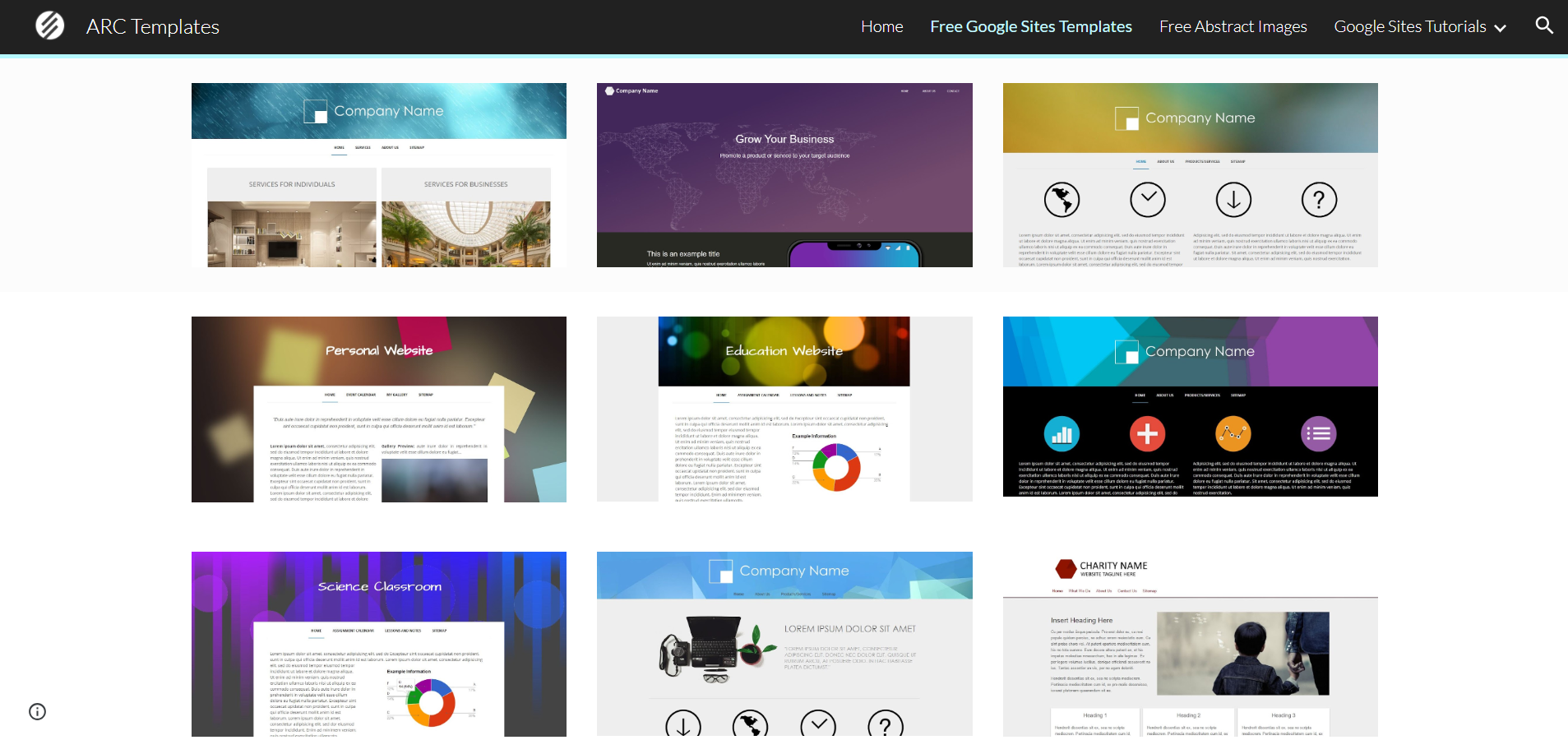

On the other hand, Dreamhost’s website builder offers a user-friendly interface that allows for a high degree of customization flexibility. Users can edit various elements including text, images, backgrounds, and layout structures to match their preferences. The platform also provides a wide range of themes and templates that can be further customized to ensure the final website aligns with the user’s brand identity.

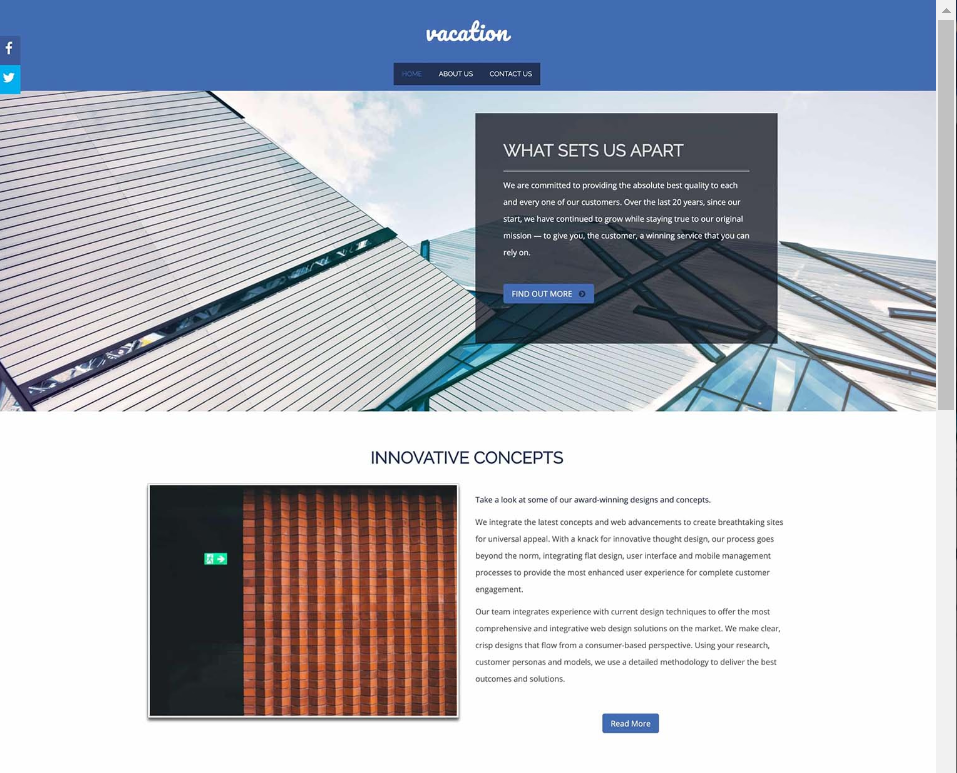
Get a head start on website creation with AI
Create a custom website tailored to your business needs 10X faster with 10Web AI Website Builder!
Ease of use
Ease of useReflects the platform’s overall user-friendliness.Score
Components:
- Learning curve (40%): Quickness and ease of getting started.
- Interface design (30%): Simplicity and intuitiveness of layout.
- User guidance (20%): Quality of tutorials and support.
- Flexibility (10%): Adaptability to various user skills.
 8.3
8.3
 8.2
8.2
🏆 Winner: Google Sites
. With a score of 8.3, Google Sites edges out Dreamhost (8.2) in terms of ease of use. Google Sites’ user-friendly interface and seamless integration with other Google services make it a straightforward tool for creating basic websites. On the other hand, Dreamhost’s website builder is also user-friendly and caters to both beginners and more seasoned users.
Learning Resources
🏆 Winner: Dreamhost
. Both platforms offer extensive learning resources, but Dreamhost provides a wider range of topics, from simple site setup to advanced customization and optimization techniques, catering to both beginners and experienced users.
For ecommerce
EcommerceMeasures the platform’s effectiveness in supporting online business activities.Score Components:
- Ecommerce themes and templates (20%): Variety and design of templates.
- Product management (25%): Ease of managing and organizing products.
- Payment options (25%): Variety and convenience of payment methods.
- Ecommerce features (20%): Features for managing an ecommerce store.
- Integration (10%): Compatibility with external e-commerce tools and services.
 1.8
1.8
 7.4
7.4
When it comes to ecommerce, Dreamhost clearly outperforms Google Sites. Dreamhost offers a comprehensive ecommerce solution with WooCommerce-ready features, a variety of themes, and support for popular payment gateways. Google Sites, on the other hand, does not have built-in ecommerce features and relies on third-party tools and widgets for ecommerce functionalities.

|

|
|
|---|---|---|
|
Ecommerce themes and templates |
0.0 |
7.0 |
|
Product page customization |
0.0 |
7.8 |
|
Payment processing and commissions |
1.0 |
7.5 |
|
POS capabilities |
0.0 |
7.0 |
|
Payment gateways |
2.0 |
7.7 |
|
Product numbers |
0.0 |
6.5 |
|
Additional ecommerce features |
0.5 |
7.2 |
Google Sites ecommerce features:
Google Sites does not have built-in ecommerce features. However, you can integrate ecommerce functionalities into a Google Sites website by embedding third-party tools or widgets, linking to an external ecommerce platform, or using buttons that link to payment processors. For instance, you could use Google Forms for order forms and integrate PayPal or another payment service for transactions. To have a full-fledged ecommerce platform with Google Sites, you’d need to rely on these external integrations or services.
Dreamhost ecommerce features:
- WooCommerce-Ready Themes
- Magento integration
- Shopify integration
Ecommerce themes & templates
Google Sites does not offer any ecommerce templates. On the other hand, Dreamhost facilitates ecommerce site creation mainly through WooCommerce, offering a powerful, open-source platform with plans designed to cater to varying levels of ecommerce activity. Additionally, Dreamhost’s WP Website Builder, equipped with BoldGrid, provides a range of mobile-friendly themes for easy site customization without coding knowledge.
Product page customization
Google Sites lacks any product page customization features, as the products can be listed with embedding third-party platforms, all the customization can be done within the mentioned platforms. In contrast, Dreamhost offers a range of customization possibilities for ecommerce product pages through the integration of WooCommerce. These possibilities include layout adjustments, adding custom tabs, introducing custom fields and sections for additional product information and FAQs, implementing dynamic content like personalized recommendations, and enabling product variations with swatches and custom product builders.
Payment processing
You can integrate payment gateways into Google Sites using external tools or links, not through native features. This can be done by embedding HTML code for payment buttons from services like PayPal, Square, or Stripe, or by linking to an external checkout page. Third-party ecommerce widgets also offer a way to add payment functionalities. However, Google Sites doesn’t offer the comprehensive ecommerce capabilities that dedicated platforms provide.
On the other hand, Dreamhost supports a variety of popular payment gateways like PayPal, Stripe, Authorize.Net, Amazon Pay, and Square, each with its own fee structure but no additional charges from Dreamhost. These gateways offer features like POS capabilities, fraud detection, and international currency support, making Dreamhost a versatile choice for website builders focusing on WordPress integration.
Website Editors
Website EditorsEvaluates the platforms’ website building and editing capabilities.Score Components:
- Customization tools (40%): Range and power of editing features.
- Editor usability (30%): User experience within the editor.
- Design flexibility (20%): Freedom in layout and design changes.
- Update and maintenance ease (10%): Simplicity of updating and maintaining the site.
 7.0
7.0
 7.3
7.3
🏆
Winner: Dreamhost
. Dreamhost, with a score of 7.3, offers a user-friendly interface for creating and customizing WordPress websites, employing a drag-and-drop editor that eliminates the need for coding skills. It offers a selection of mobile-friendly themes to accommodate various website needs, along with essential tools like backups to safeguard user data. The builder streamlines the website creation process, from theme selection and layout customization to the final installation, enabling users to easily adjust their site’s appearance and functionality.
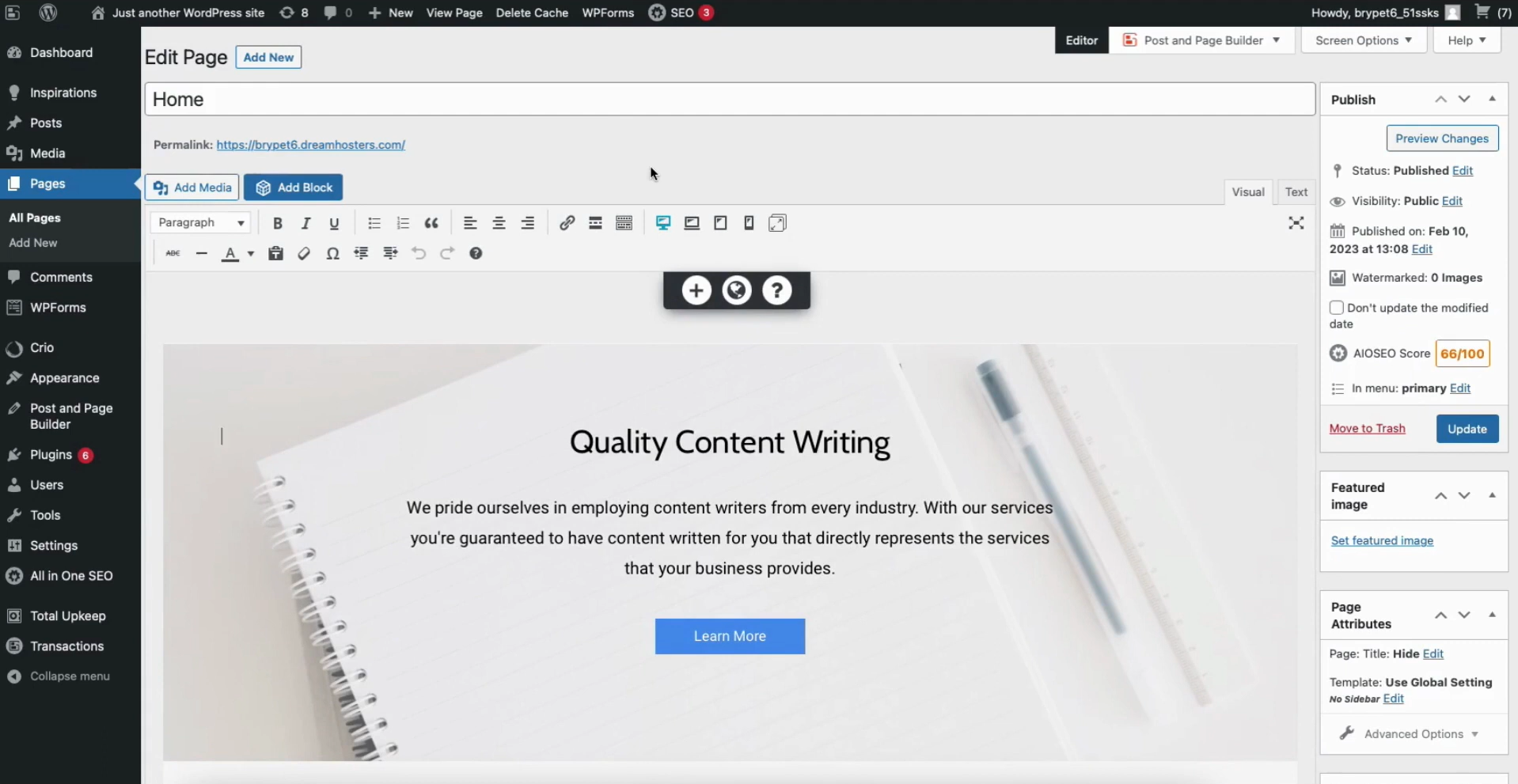
Google Sites, scoring 7.0, offers a user-friendly website builder editor that allows users to create and design websites without needing coding knowledge. With its drag-and-drop interface, users can easily add, customize, and arrange elements such as text, images, and videos on their web pages. It also provides a variety of templates and design options to help users get started quickly and ensure their site looks professional. Additionally, Google Sites integrates seamlessly with other Google services, enabling the incorporation of Google Docs, Sheets, Slides, and Maps directly into the website.
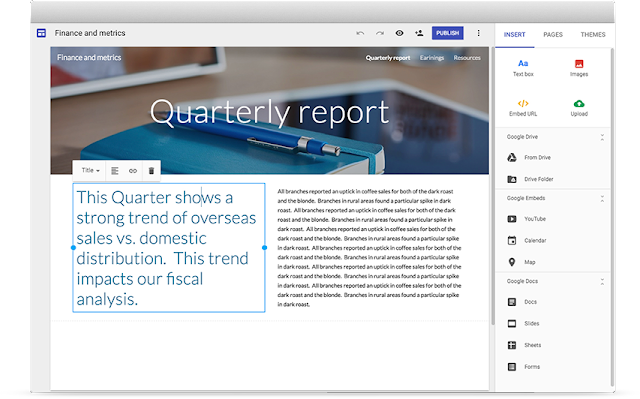
Mobile editor/app
 0
0
 5.5
5.5
🏆
Winner: Dreamhost
. Neither Google Sites nor Dreamhost offer a dedicated mobile editor app. However, Dreamhost does allow users to modify their websites using a mobile browser, albeit with certain restrictions. This gives Dreamhost a slight edge over Google Sites, which does not provide any mobile editing capabilities. Therefore, if mobile editing is a priority for you, Dreamhost may be a better choice.
Product testing options
Product Testing OptionsAssesses the options for trying out platform features before commitment.Score Components:
- Trial quality (40%): Extent and usefulness of the trial or free version.
- Feature accessibility (30%): How many features are available to test.
- Trial duration (20%): Length of the trial period.
- Ease of transition (10%): Smoothness of moving from trial to paid plans.
 6.9
6.9
 2.7
2.7
Overall Result
:
Google Sites wins
. Google Sites scores 6.9, significantly higher than Dreamhost’s 2.7. Google Sites offers a free version and a 14-day free trial, during which some premium features can be tested. Dreamhost, on the other hand, does not offer a free or trial version, but allows testing of premium features during a 30-day refundable period.

|

|
|
|---|---|---|
|
Free Plan |
Yes |
No |
|
Trial Duration |
14 days |
No |
|
Testing Premium Features |
Some features during free trial | During 30-day refundable period |
Price
PriceLooks at the cost-effectiveness and value for money of each platform.Score Components:
- Plan value (40%): What each pricing tier offers.
- Transparency and clarity (30%): Clearness of pricing structures.
- Flexibility of plans (20%): Range of options to suit different budgets.
- Hidden costs (10%): Additional expenses not included in the plan.
 8.1
8.1
 7.8
7.8
Google Sites and Dreamhost offer competitive pricing plans, but Google Sites provides more scalability with its enterprise plans, while Dreamhost offers significant discounts on annual billing.

|

|
|
|---|---|---|
|
$0-$10 |
Business Starter ($7.20/month): This plan includes basic features suitable for individuals or small businesses, offering professional email through Gmail, 30GB of storage per user, and video meetings for up to 100 participants. It allows to manage 1 website and there is no limitation on number of pages. Value for price: 6.0 |
Shared Starter ($7.99/month): Shared Hosting with unmetered bandwidth but low SSD storage, Free SSL certificate, automated daily backups. This plan allows to manage only 1 website and there is no limitation of number of pages offered. Value for price: 6.5 |
|
$10-$20 |
Business Standard ($14.40/month): Suitable for growing businesses, this plan provides 2 TB of storage per user, video meeting capacity for up to 150 participants with recording features, and access to smart booking pages and shared drives. It allows to manage 1 website and there is no limitation on number of pages. Value for price: 7.5 |
Shared Unlimited ($13.99/month): Shared Hosting with unlimited websites, unmetered bandwidth, but low SSD storage, pre-installed Free SSL certificate, automated daily backups. Value for price: 7.5 |
|
$20-$30 |
Business Plus ($21.60/month): Designed for larger businesses needing more robust capabilities, offering 5 TB of storage per user, advanced security options, and video meetings for up to 500 participants. It allows to manage 1 website and there is no limitation on number of pages. Value for price: 8.5 |
DreamPress ($23.99/month): Isolated Cloud hosting with unmetered bandwidth, 30GB SSD storage, staging website, fast NGINX pre-installed Free SSL certificate, Free WordPress migrations, automated daily backups and on-demand 1-click restore, specialized WordPress support. This plan allows to manage only 1 website and there is no limitation of number of pages offered. Value for price: 8.0 |
|
$30-$40 |
No offering at this amount. |
DreamPress Plus ($34.99/month): Isolated Cloud hosting with unmetered bandwidth, 60GB SSD storage, staging website, unlimited CDN, fast NGINX pre-installed Free SSL certificate, Free WordPress migrations, automated daily backups and on-demand 1-click restore, specialized WordPress support, 3-phone support callbacks. This plan allows to manage only 1 website and there is no limitation of number of pages offered. Value for price: 8.5 |
|
$80+ |
No offering at this amount. |
DreamPress Pro ($89.99/month): Isolated Cloud hosting with unmetered bandwidth, 120GB SSD storage, staging website, unlimited CDN, fast NGINX pre-installed Free SSL certificate, Free WordPress migrations, automated daily backups and on-demand 1-click restore, specialized WordPress support, 5-phone support callbacks and priority support. This plan allows to manage only 1 website and there is no limitation of number of pages offered. Value for Price: 9.0 |
location. As a result in rare cases the prices displayed here can differ from the ones you see on their
websites.
Hosting quality
Hosting
qualityExamines the reliability and performance of the hosting solutions.Score Components:
- Uptime (40%): Consistency and reliability of website availability.
- Speed (30%): Loading times and performance.
- Bandwidth and storage (20%): Sufficiency of resources provided.
- Data centers (10%): Quality and distribution of hosting infrastructure.
 8.2
8.2
 7.2
7.2
Winner: Dreamhost
. Dreamhost offers a more robust hosting solution with shared and cloud hosting options, a higher uptime of 99.93%, and a 100% uptime guarantee. It also provides automated daily backups. Google Sites, on the other hand, offers basic cloud-based managed hosting with a 99.9% uptime. While Google Sites has more data centers globally, Dreamhost’s hosting features make it a more reliable choice for users who prioritize uptime and data safety.

|

|
|
|---|---|---|
|
Do they offer hosting? |
Yes, basic storage with 100MB free per site, can be increased by upgrading to Google Workspace |
Yes, included in all their plans, shared or cloud hosting depending on the plan, with automated daily backups |
|
Data Centers: |
Google operates a total of 21 data centers across the globe: 2 in Asia, 5 in Europe, 13 in US and 1 in South America |
2 data centers in US: Ashburn, Virginia and Hillsboro, Oregon |
|
Type of hosting: |
Cloud based managed hosting |
Shared Hosting, Cloud Hosting |
|
Uptime: |
99.9% |
99.93% |
|
Uptime Guarantee: |
Yes, 99.9% |
Yes, 100% |
Website Speed Optimization
Website Speed OptimizationEvaluates optimization of website loading timesScore Components:
- PageSpeed Score (30%): Google’s score indicating performance optimization.
- Loading Time (30%): The average time until a website is fully interactive.
- Mobile Optimization (15%): Optimization effectiveness for mobile devices.
- Resource Optimization (15%): Optimizing images, scripts, and other heavy resources.
- CDN Usage (10%): Use of CDN to enhance speed across geolocations.
 3.3
3.3
 3.5
3.5
🏆 Winner: Google Sites
Both Google Sites and Dreamhost have strategies in place for website speed optimization, but Google Sites takes the lead due to its automated optimization, use of CDN, mobile optimization, browser caching, code minification, and use of AMP.

|

|
|
|---|---|---|
|
Focus |
Automated Optimization, CDN, Mobile Optimization, Browser Caching, Code Minification, Use of AMP |
Built-in Caching on higher plans, Code minification, Image optimization |
|
Performance Tools |
Google Lighthouse, PageSpeed Insights |
Google PageSpeed Insights Integration |
|
Key Strategies |
Automated Optimization, CDN, Mobile Optimization, Browser Caching, Code Minification, Use of AMP |
Built-in Caching on higher plans, Code minification, Image optimization |
|
Load Times |
Google does not disclose statistics about website Page Speed scores, or load times |
1.75-3 seconds average |
|
Page Speed Scores Range |
Google does not disclose statistics about website Page Speed scores, or load times |
No data is available |
|
Core Web Vitals Improvement |
Emphasis on LCP, FID, CLS improvements |
Dreamhost does not disclose any information on their Core Web Vitals improvements |
Google Sites, a structured web page-creation tool included in the Google Workspace package, has a range of strategies for speed optimization. These include automated optimization, use of a content delivery network (CDN), mobile optimization, browser caching, code minification, and the use of Accelerated Mobile Pages (AMP). Google Sites also places an emphasis on improving Core Web Vitals, specifically the Largest Contentful Paint (LCP), First Input Delay (FID), and Cumulative Layout Shift (CLS).
Dreamhost, on the other hand, offers a comprehensive website builder tailored for users aiming to create professional-looking websites without the need for extensive coding knowledge. Their platform, Remixer, allows users to choose from a variety of themes and customize them using a simple drag-and-drop interface. Dreamhost’s strategies for speed optimization include built-in caching on higher plans, code minification, and image optimization. However, Dreamhost does not disclose any information on their Core Web Vitals improvements.
Get a head start on website creation with AI
Create a custom website tailored to your business needs 10X faster with 10Web AI Website Builder!
Plugins and integrations
Plugins and integrationsMeasures the range and effectiveness of additional plugins and integrations.Score Components:
- Variety of options (40%): Range of available add-ons.
- Integration smoothness (30%): Ease of integrating plugins into the site.
- Quality of plugins (20%): Functionality and reliability of the options.
- Custom integration capabilities (10%): Support for custom or third-party integrations.
 6.4
6.4
 8.8
8.8
🏆 Winner: Dreamhost.
Dreamhost scores 8.8, offering a wide range of WordPress plugins that cover a wide range of functionalities, enabling users to extend their sites functionality. While Google Sites, with a score of 6.4, offers a wide array of plugins and extensions to enhance website functionality, Dreamhost’s integration with WordPress and the availability of both free and premium plugins give it the upper hand.
It is worth mentioning that both platforms offer a variety of plugins to enhance functionalities such as social media integration, e-commerce, chats, forms, video, audio, and more. However, Dreamhost’s seamless integration with WordPress provides an easy transition for users looking to leverage more advanced features or migrate their existing sites.

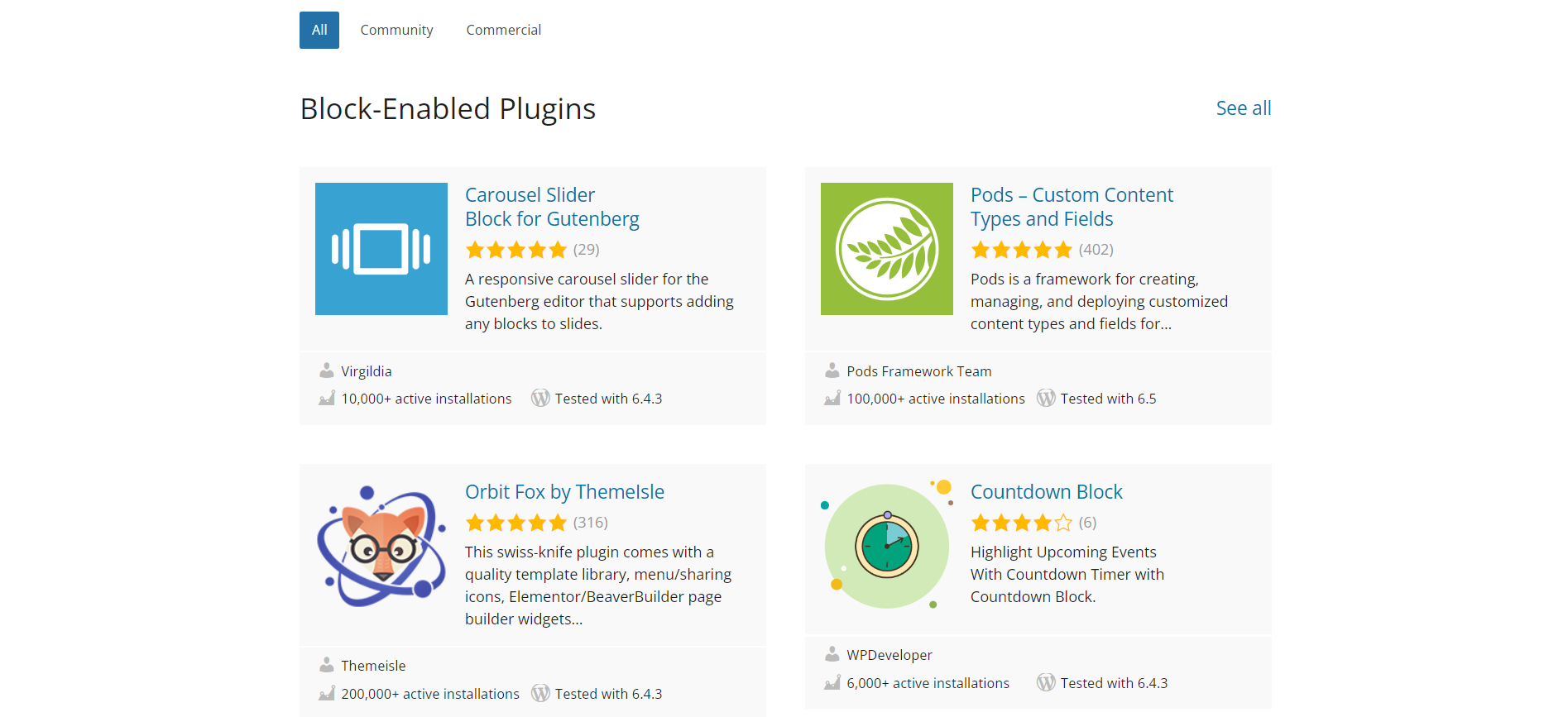
Marketing Features
Design FunctionalitiesRepresents how well each platform allows for creative design and customization of websites.Score Components:
- Template Variety (30%): Range and quality of design templates.
- Customization (30%): Flexibility and options for design alterations.
- User Interface (20%): Ease and intuitiveness of the design process.
- Responsiveness (10%): Adaptability to different devices and screen sizes.
- Innovation (10%): Unique design features and tools.
 2.6
2.6
 8.0
8.0
🏆
Overall Winner: Dreamhost
. Dreamhost stands out for its comprehensive SEO Toolkit, integration with email marketing platforms, and seamless social media integration. Google Sites, while offering basic SEO settings and Google Analytics integration, lacks in areas such as email marketing, blogging, and ads and promotions.

|

|
|
|---|---|---|
|
SEO Tools |
Basic SEO settings | Comprehensive SEO Toolkit |
|
Email Marketing |
No | Yes, through integration of third-party plugins |
|
Blogging |
No | Yes |
|
Social Media Integration |
Yes, basic integration | Yes, seamless integration |
|
Analytics and Reporting |
Google Analytics integration | Google Analytics integration |
|
Ads and Promotions |
No | Yes, through integration of third-party plugins |
Customer Support
Customer supportEvaluates the quality and availability of support options.Score Components:
- Response time (40%): Speed of support responses.
- Support quality (30%): Effectiveness and helpfulness of the support.
- Availability (20%): Range of support channels (phone, chat, email).
- Resource richness (10%): Quality of self-help and educational materials.
 7.2
7.2
 7.5
7.5
🏆 Winner: Dreamhost
. Comparing Google Sites vs Dreamhost, Dreamhost takes the lead in this category with its 24/7 live chat and email support, ensuring users receive timely assistance. Dreamhost’s commitment to minimal wait times and quick email responses makes it a reliable choice for users needing consistent support.
Google Sites primarily offers self-service resources like a Help Center and community forums, with direct support available to Google Workspace customers. While Google Sites provides 24/7 support for critical issues to eligible customers, the level of support varies by subscription tier. This makes Dreamhost a more accessible option for users seeking immediate and comprehensive support.
Security
SecurityLooks at the platforms’ security measures and data protection.Score Components:
- Data protection (40%): Safeguards for user and customer data.
- SSL and encryption (30%): Implementation of secure connections.
- Compliance (20%): Adherence to industry security standards.
- Regular updates (10%): Frequency of security updates and patches.
 9.3
9.3
 8.2
8.2
🏆
Winner: Google Sites
. Google Sites, part of the Google Workspace, offers robust security measures including SSL encryption, two-factor authentication, and automatic malware scanning. It also benefits from Google’s regular security updates and compliance with international data protection standards. Google’s infrastructure offers DDoS protection and data redundancy, ensuring a secure environment for website creators and visitors.
Although it may not offer the same level of specialized security features as Google Sites, Dreamhost provides comprehensive security measures including free SSL certificates, domain privacy, multi-factor authentication, and daily backups. They also offer advanced security features such as DreamShield for malware removal. However, despite these robust security protocols, Dreamhost has experienced breaches in the past, highlighting the importance of continuous vigilance and the implementation of personal security practices alongside provider measures.
AI Capabilities
AI capabilitiesMeasures the effectiveness of AI-driven features and tools.Score Components:
- Automation efficiency (40%): Impact of AI on streamlining processes.
- Personalization (30%): AI-driven customization for users or customers.
- AI-Assisted design (20%): Role of AI in website design and functionality.
- Data analysis (10%): Use of AI in interpreting user data and analytics.
 0
0
 1.2
1.2

|

|
|
|---|---|---|
|
Personalized Design |
|
|
|
SEO Optimization |
|
|
|
Customer Behavior Analysis |
|
|
|
Sales Predictions |
|
|
|
Inventory Management |
|
|
|
Content Generation |
|
AI business name generator |
🏆 Winner: Dreamhost
. Although both Google Sites and Dreamhost have minimal AI capabilities, Dreamhost slightly edges out with a score of 1.2 due to its AI business name generator feature. This tool allows users to generate potential business names based on their industry and a few keywords.
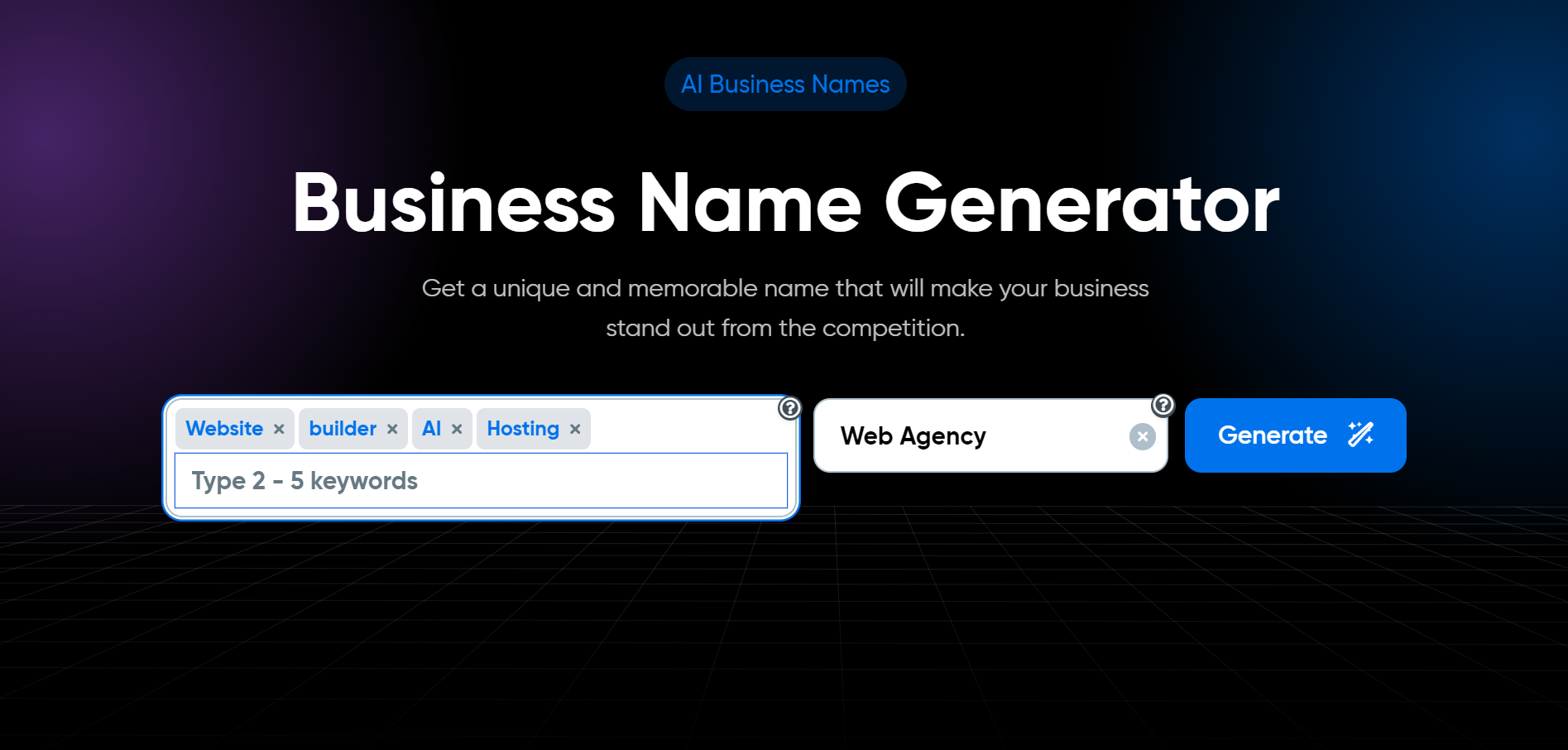
Google Sites, with a score of 0, does not have any AI capabilities. While Google Workspace offers the Gemini AI as an add-on, this feature is not integrated into Google Sites.
User Management
User ManagementAssesses the platforms’ capabilities in managing user roles, permissions, and accessibility.Score Components:
- Role Customization (40%): Flexibility in creating and defining user roles and
permissions. - Ease of Management (30%): User interface and tools for managing users.
- Access Control (20%): Effectiveness of access control measures for different user
levels. - Scalability (10%): Ability to manage a growing number of users efficiently.
 7.8
7.8
 8.8
8.8
🏆 Winner: Dreamhost
. Both Google Sites and Dreamhost allow multiple users to collaborate on a website with different roles and permissions. However, Dreamhost provides a more detailed breakdown of user roles and their respective permissions.
- Google Sites allows multiple users to collaborate with different roles, including Owners, who have full control, and Editors, who can modify content but not site settings. There’s no strict limit on the number of users who can edit a site, allowing flexibility in management and development. Viewers can only see the site, with no editing permissions. This structure supports collaborative website building with varied levels of access and control for different users.
- DreamHost’s website builder primarily uses WordPress, which allows for multiple users to edit a website. While DreamHost doesn’t specify a limit on the number of users, WordPress enables the addition of numerous users with various roles such as Administrator, Editor, Author, Contributor, and Subscriber. Each role has its own set of permissions and capabilities, allowing for flexible and controlled access for different users. This feature makes it convenient to manage a website collaboratively on the DreamHost platform.
Dreamhost User Roles and Access Levels:
| Role | Description | Access Highlights |
|---|---|---|
| Administrator | Users with full access to all administration features, including Elementor settings. | Can edit all content, Access to Elementor settings, Can install plugins and themes, Can manage users |
| Editor | Users who can manage and publish content including pages and posts. | Can edit pages/posts created with Elementor, Cannot access Elementor settings, Can manage categories, tags, and links, Can moderate comments |
| Author | Users who can publish and manage their own posts. | Can create posts with Elementor, Cannot edit pages, Limited access to media library, Cannot access Elementor settings |
| Contributor | Users who can write and manage their own posts but cannot publish them. | Can create content with Elementor, Cannot publish or edit pages, No access to Elementor settings, Submissions require review by higher-level roles |
Additional Features

|

|
|
|---|---|---|
|
SSL Certificate |
|
|
|
Custom Domain |
|
|
|
Free Custom Domain Included |
|
|
|
International Domains |
|
|
|
Mobile Responsive |
|
|
|
Page Speed |
|
|
|
Website Builder Mobile App |
|
|
|
Convert a Website To An App |
|
|
|
Website Analytics |
|
|
|
Multilingual Sites |
|
|
|
Multiple Users |
|
|
User Feedback
Users consistently praise Google Workspace, particularly Google Sites, for its seamless integration, ease of use, and collaborative features, making it a go-to solution for various professional and educational needs. The platform’s simplicity and user-friendly interface are lauded, enabling effortless website creation and sharing of information within organizations. While some users desire more customization options and additional features, overall, Google Workspace remains highly valued for its versatility and streamlined workflow facilitation.
Users appreciate DreamHost WP Website Builder for its ease of use, broad template selection, and integrated hosting solutions, highlighting its utility in building and managing websites efficiently. However, some users suggest improvements in areas such as image editing capabilities, customer support, and software optimization to enhance speed and functionality. While many find it a cost-effective and user-friendly option for website development without coding, others express concerns over occasional software bugs, slow website performance, and the desire for more advanced features.
The making of this blog
We followed a clear, step-by-step process to write and research this article.
FAQ
Which platform is better for beginners, Google Sites or Dreamhost?
Can I use both Google Sites and Dreamhost for ecommerce?
How do Google Sites and Dreamhost differ in terms of customization and design flexibility?
What are the major differences in pricing and value between Google Sites and Dreamhost?
Which platform offers better customer support, Google Sites or Dreamhost?










